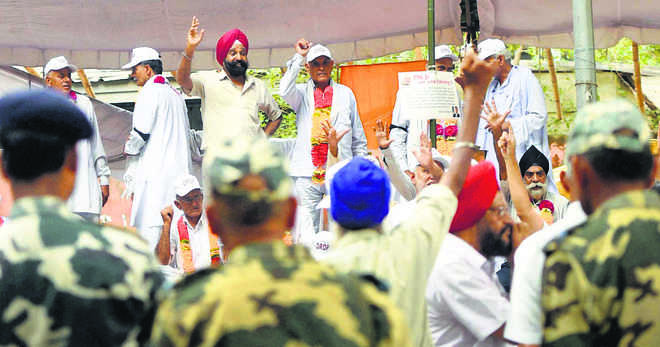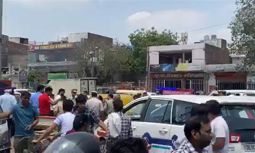
No price enough for a soldier, serving or not.
Lt-Gen NS Brar (retd)
AS part of the ongoing agitation by ex-servicemen (ESM) for one rank, one pension (OROP), a large number had gathered on the highway bisecting the Bathinda military station, which also has the Corps Headquarters, and had intended to enter the station to agitate and hand over a memorandum to the Corps Commander. The gates had been closed, thus preventing them from entering. A media photograph showed a very agitated and aggressive police officer confronting the veterans. The whole incident left many veterans worried: what if the police were to use force against the agitating ESMs and this in turn provoked action by serving personnel? What if the gates were opened by the men on duty? The worry is that it could very well happen with grave consequences.
The purpose of the profession of arms has been and will remain the management of organised violence and is inextricably linked with the ultimate question of life and death. The shared uniqueness of the profession moulds its members into the ‘Brotherhood of Arms’ with shared values, beliefs, standards and codes of conduct. The soldier (which includes the sailor and airman) dons the uniform on oath to go by land, sea or air where ordered by his superiors and execute the task allotted even at the cost of his life, if required. Willingness to perform unquestionably, even at the cost of his life, does not come merely because he is paid to do so or simply because his superiors have ordered him to do so. It comes on the foundation of mutual trust and camaraderie between the leader and the led. It also comes on the basis of the time honoured concept of izzat. Wafadari, imandari, self-esteem, pride in honourable soldiering are constant bywords in the military community — something largely alien to the outside environment. Surely, a soldier will not launch himself into battle with a high probability of loss of limb or life merely on verbal words of command unless this rests on unquestioning faith and trust in his superior. By the same extension, at the highest level, the armed forces of the country also act on the basis of mutual trust between the political and military leadership. The military leadership strives to ensure mutual trust on the foundations of justice and fair play. No leader worth his salt can be seen to be acting unfairly or in a partisan manner. Over long years of service this concept of justice and fair play is deeply ingrained in a serviceman. He carries it with him on hanging his uniform. This unique culture rests on accepting the spoken word as inviolable. The soldiers angst arises when society at large and the political leadership in particular is perceived to be ignoring and rescinding on the spoken commitment.
An unspoken social contract exists between the armed forces and the people of India. At one end of the bargain exists a deep sense of admiration, respect and intrinsic affection for the soldier, at the other end, the people expect the armed forces to deliver when required, no matter what the demand or cost. The people believe it to be the one institution that has not been affected by the all-pervasive moral decline of Indian society. This social contract is vital for the future of the armed forces, given the indifference or ignorance of matters military by the politico-bureaucratic combine. The soldier’s end of the contract will endure as long as he perceives to be given a fair deal by the powers that be and by civil society at large.
In our context, and at the very basic level, the emphasis of society at large to reduced deference, if not indifference, to authority and discipline and enhanced awareness of individual rights with lack of corresponding obligation towards duty and the all-pervasive culture of corruption are at odds with what the military emphasises. The Defence Minister recently expressed the view that the country had lost respect for the armed forces or the armed forces relevance had declined as there had not been any war since 1971. This perception needs to be clarified. It is not the nation at large which has lost respect for the armed forces. It’s the totally corrupt lower-level functionaries of the government at all levels and across all areas of the soldier’s interaction for his basic problems, which does not do anything without their cut, which has lost respect for the armed forces. In an all-pervasive environment of petty graft, seen and experienced before entering the service and when back in the environment on leave, how does a military man reconcile to the core value of imandari the profession demands? It is also the highest level of the government, the politico-bureaucratic elite — which is perceived to have lost respect for the armed forces in pursuit of their agenda or narrow objectives. If there is any institution left in the country which is respected by the people, it is the armed forces. After every war, the military was downgraded in status, pay and pension by the pay commissions. So much for the respect for or importance of the armed forces which war generates!
A worthy politician had recently derided the death of a soldier by opining that ‘they are paid to die’. Nothing could be more callous or ill-informed. The soldier may well ask if he could kill someone and pay his family to go scot free. Paying the soldier alone does not buy his obligation for duty and death. Respecting his dignity, promoting his self-esteem and treating him as an important member of society ensures such a commitment.
Much as the serviceman, and by extension the ex-serviceman, abhors the idea of agitating on the streets, undertaking fasts or indulging in collective protests, today he sees these as the only options in an uncaring environment. The recent death of policemen in a terrorist incident saw their families sitting in protest demanding jobs and compensation. Giving a go by to the laid down rules for ex gratia and other dispensations, the political leadership acquiesced. It would be a very sad day if the soldiers’ families were to agitate similarly.
Our polity by design and default has proceeded to politicise, downgrade and demoralise its own armed forces and veterans. As Bahadur Shah Zafar wrote after 1857: “Na Shah Iran ne na Czar Roos ne, Angres ko bardad kiya kartoos ne.” It can now be said: “Cheen ne, na Pakistan ne, apne fauj ko barbad kiya Hindustan ne.”
A dissatisfied military is not in the interest of any nation, least of all India, which has to contend with multifarious internal and external security issues. The nation and the political leadership must be alive to the prevailing sentiments and act appropriately lest the gates of military stations are opened.
— The writer is a former Deputy Chief, Integrated Defence Staff



























